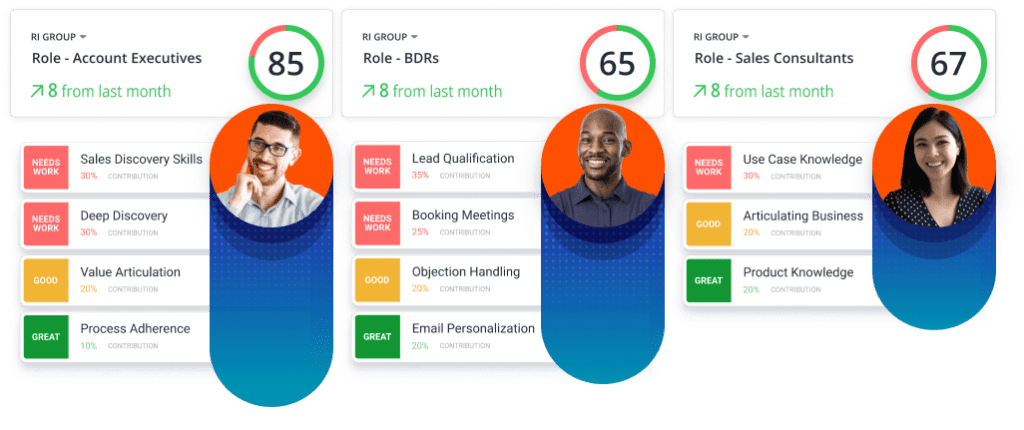Today’s sellers face a ton of challenges. They need the right skills to overcome these challenges and emerge successful.
There’s a subset of top performers on every sales team. These are the folks who are adept at building relationships and closing deals—even in less-than-ideal circumstances. In a perfect world, you could clone these top sales reps.
Of course, this isn’t possible. But the most successful revenue organizations are doing the next best thing. They’re spending time figuring out what makes their top sellers so great and then working to replicate those skills and behaviors across the entire revenue organization.
Taking this approach, you can create an entire team of top performers. It starts with determining what skills are needed for each role on your sales team.
Defining what sales excellence looks like
Sellers have limited time, and it behooves them (and their organization) to focus their time on the prospects that best fit their offering. To help ensure that’s the case, most organizations identify and document their ideal customer profile (ICP).
Far fewer businesses take the time to identify and document their ideal rep profile (IRP), which is the list of skills, competencies, and behaviors a revenue team member needs to succeed in their role. However, the IRP continues to be a growing trend among sales productivity practitioners.
The growth of this trend makes sense. After all, how can a revenue organization drive excellence when it doesn’t even know what excellence looks like?
The IRP is essential to true sales productivity
The first step in driving org-wide excellence is to take the time to identify and document the skills needed for success. The most successful sales organizations define IRPs for their go-to-market (GTM) or customer-facing roles. The most common roles for which organizations define their IRP are:
- Account executives (AEs)
- Business development representatives (BDRs)
- Channel sales specialists (CSSs)
- Customer success managers (CSMs)
- Sales engineers (SEs)
Team members should be continuously measured against this “gold standard” to identify each individual’s learning gaps. Then, organizations can deliver individualized learning and sales coaching that closes these gaps and creates more peak performers.
The top 3 skills for every member of the revenue team
Sure, it’s key to identify the skills each member of your revenue team needs to succeed. But what exactly are those skills?
Of course, these vary by role. The skills needed to be a successful BDR differ from those needed to excel as a sales engineer.
Recently, we analyzed activity from more than a million users at 400+ companies to understand how the best organizations are getting their sales teams ready to close more deals. We shared our key findings in our State of Revenue Productivity 2024 Report. Based on this analysis, we’ve identified the top three skills needed by five key revenue team members.
The 3 most important skills for account executives
Account executives work day in and day out to understand the needs and challenges of businesses — and then provide solutions to address them. The three most important skills for success in this role are:
Once an AE has determined the buyer’s needs, they must have the skills to articulate their solution’s value.
Our analysis found that over half (54%) of sales calls include more negative sentiment than positive. Objections are one example of negative sentiment. AEs should expect objections— and have the skills to address and overcome them.
Prospects often don’t accept an offer as-is. Instead, they want to negotiate. This is especially true in today’s economic climate. AEs must have the skills to navigate the negotiation stage of the sales cycle expertly.
The 3 most important skills for business development representatives
BDRs are often the first touchpoint a prospect has with your company. They need to master these three skills:
BDRs must know your ICPs inside and out — and be able to quickly and accurately determine if a prospect is a good fit for your company’s offerings.
Like AEs, BDRs must be prepared to expect resistance from prospects and equipped to handle it. The right enablement and coaching can ensure they’re ready to address any objection that comes their way.
Strong communication skills include both speaking and listening. BDRs must master active listening skills so they can understand what a prospect is saying and respond thoughtfully.
The 3 most important skills for channel sales specialists
Channel sales refers to the practice of a third party (also known as a partner) selling your company’s products. The top three skills needed for channel sales specialists are:
Channel sellers must know a product inside and out — and be equipped to handle any question. Continuous enablement and coaching ensure they always have current, accurate product knowledge.
Like AEs, channel sellers must be experts at conveying the value of a particular solution to the prospect.
Prospects are more likely to make a purchase from a sales rep who’s taken the time to get to know them and earn their trust. As such, relationship-building skills are essential for any channel sales specialist.
The 3 most important skills for customer success managers
Customer success managers spend most of their time meeting with current customers to address any issues and ensure the customer gets the most value from the product provided. As well, they’re often responsible for upsells and renewals. They must have a solid mastery of the following three skills to be successful in their roles:
CSMs spend a lot of time interacting with customers via phone and email. Often, they need to share feedback from customer interactions with other departments, including sales and product. Solid written and verbal communication skills are a must.
It’s less expensive to retain an existing customer than it is to obtain a new one. As such, CSMs must perfect their renewal skills. Renewal time can also be a great opportunity for upsells. CSMs should be skilled at identifying upsell opportunities and articulating the value of the upsell to the customer.
The CSM is typically their go-to if a customer runs into a problem. Customer success team members must have solid problem-solving skills to help resolve issues quickly and effectively.
The 3 most important skills for sales engineers
A sales engineer is a member of the B2B sales team whose specialty is selling complex technical products and services. They must have a mastery of these three skills:
Sales engineers must be well-versed in the myriad ways companies use a solution and can use this knowledge to articulate how the solution can work for a specific prospect.
Similar to other roles, sales engineers must be experts at articulating business knowledge to prospects.
Prospects often come to sales engineers with technical questions and objections. Sales engineers
Start building a winning revenue team
Today, many revenue leaders accept that great sellers are born, not made. They either have what it takes, or they don’t.
But that isn’t reality. Sales excellence can be taught.
First, organizations must identify the success-related skills for each revenue team role. Then, they can measure all revenue team members against their IRP to understand where they’re shining and falling short. Equipped with these insights, revenue teams can deliver personalized training, enablement, and coaching to ensure each master the skills that matter most in their role.

In other words, you can build a team of top performers – no cloning machine required.
But not all enablement and productivity programs drive results. Instead, you need the right, data-driven strategy and technology to power your sales enablement and sales productivity programs.
Revenue Enablement in Mindtickle
Ready to see how Mindtickle empowers winning revenue organizations to build enablement and productivity programs that drive sales excellence and revenue growth?
Get a DemoThis post was originally published in June 2022 and was updated in April 2024.







